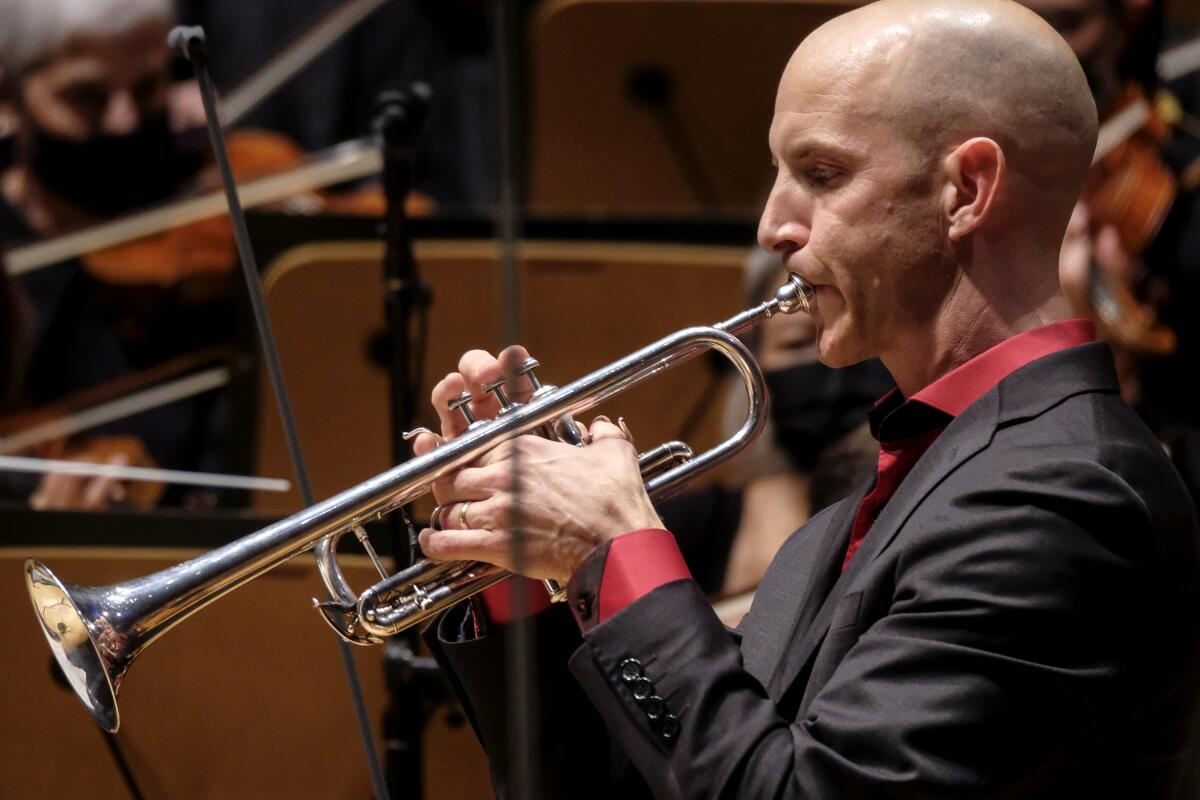Review: L.A. Phil gives Steven Mackey’s riotous trumpet ‘Shivaree’ a defining premiere

Shivaree, chthonian, erumpent, tintinnabulation, exonumia, requiescat, deipnosophist, omphaloskepsis, horripilation, deliquesce, apopemptic. How many of these fabulous words do you know? Even spellcheck, as I write, is stumped by exonumia, which are items that resemble money but are not meant to circulate as money.
These are the words, retrieved from the Dictionary.com “Word of the Day” feature, that flashed above each of the 12 short movements of Steven Mackey’s dazzling, daffy “Shivaree: Fantasy for Trumpet and Orchestra,” the latest Los Angeles Philharmonic commission, on Friday night. First came the word, which was followed by Mackey’s short, fantastical musical response. The definition was flashed afterward, just as the next movement was about to start without pause in a crazy-making symphonic exonumia that resembles a concerto but isn’t technically supposed to be a concerto (even though the piece fits the Dictionary.com definition of concerto just fine).
The commission was specifically for a “Fantasy” and for the orchestra’s principal trumpet, Thomas Hooten. In the pre-concert Upbeat Live talk, Mackey credited Hooten, with whom he consulted over a two-year process of composition, as co-conspirator in the many farfetched sonic effects the soloist miraculously produced on trumpet and flugelhorn. Mackey’s Fantasy was meant to precede Mahler’s sweetly fanciful Fourth Symphony in the program, which was conducted by Gustavo Dudamel and which began with Jessie Montgomery’s own brief bit of orchestral fancy, “Strum,” turning the L.A. Phil string section into a lavish guitar.
It just so happens that Mackey is an electric guitarist who has no problem with raising a ruckus. He readily took to the idea of a shivaree, which, to quote Dictionary.com, is “a mock serenade with kettles, pans, horns and other noisemakers given for a newly married couple.” Mackey is one of America’s most imaginative composers when it comes to all the wide ways of marrying solo instruments to an orchestra. His lists of concertos and concerto-exonumia include more than a dozen written for a diverse collection of often unexpected instruments.
Los Angeles Opera stages a large-scale, four-hour Wagner opera for the first time in years.
“Shivaree” obviously can’t help but be noisy, and a highlight of the score is the large percussion section that includes party noisemakers, teacups, saucepans, a garbage can lid, flower pots, a police whistle, compressed gas and wine bottles. All are at the ready for “bursting forth” (erumpent), calling out “deities, spirits, and other beings dwelling under the earth” (chthonian), bell ringing (tintinnabulation), even, believe it or not, navel gazing (omphaloskepsis).
Yet the strange and wonderful thing about “Shivaree” is that it is far more than a riotous shiveree, except in the first movement and its short return at the end (hence 12 movements for 11 words). The trumpet and flugelhorn solos are what lead a large orchestra on its wild lexical ride.
A harp introduces a sonorous mini requiem (“Requiescat”). Hooton made popping, sucking and gassy sounds through his mouthpiece, horripilating, so to speak, which is “a bristling of the hair on the skin from cold, fear, etc.” Grainy, earthy bass rumbles the pit of a listener’s stomach in “Chthonian,” evoking the “deities, spirits and other beings dwelling under the earth.” In his cool, Miles Davis-nonchalant manner, Hooten provided one dumfounding effect after another, be they a peculiar trumpet-speak of word-like phonemes that could be made into no words found in Dictionary.com. In a nice Mahlerian touch, Hooten turned fanfares on their heads. He could be jazzy. He could be silly. He could be shed-a-tear somber in “Apopemptic,” which means leave-taking and is a tribute to Louis Andriessen. With stunning fleetness, Mackey here captured both the late, great Dutch composer’s wistful profundity as well as his brassy brazenness.
The loss of loved ones to the pandemic has given Gustavo Dudamel a fresh outlook on the L.A. Phil, his new post in Paris, and his life with his wife and son.
Pairing “Shivaree” with Mahler’s Fourth made perfect sense. This is Mahler at his most songful and least angst-ridden. The composer’s angels and devils duke it out as they always do, but with remarkable grace. The symphony has its own weirdness too, as in the second movement when the concertmaster mistunes his violin for a devilish dance. Martin Chalifour pulled that off with his own slyly horripilating suavity.
Dudamel’s polished, lovingly lyrical performance turned Mackey’s Dictionary.com list into superlatives. A well-practiced deipnosophist (“a person who is an adept conversationalist at the table”), Dudamel brought out the many sides of Mahler. In an especially gorgeous slow movement, Dudamel revealed Mahler’s ethereal omphaloskepsis as navel gazing with Buddha-level profundity.
The final movement is a song in which angels happily slaughter willing animals for heaven’s kitschy kitchen. Soprano Camilla Tilling was the deliquescing (“melting”) soloist.
In the end, Dudamel made of Mahler’s Fourth a many-layered mature symphonic shivaree, wedding Mahler’s angels and devils into a mysterious, complicated, contradictory yet loving spiritual symphonic whole for which we have a very simple word: human, “of, pertaining to, characteristic of, or having the nature of people.”
More to Read
The biggest entertainment stories
Get our big stories about Hollywood, film, television, music, arts, culture and more right in your inbox as soon as they publish.
You may occasionally receive promotional content from the Los Angeles Times.












